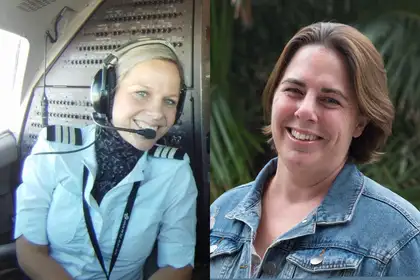
Massey Graduate Susan MacLachlan and Senior Lecturer Dr Sam Gardyne.
Susan MacLachlan, a domestic pilot with Air New Zealand, is a graduate of the Master of Sustainable Development Goals offered by the College of Humanities and Social Sciences. Her research focused on the aviation industry and climate action, one of the United Nations’ 17 Sustainable Development Goals (SDGs).
Adopted by all UN member states in 2015 as part of the 2030 Agenda for Sustainable Development, the 17 SDGs form the framework of the master’s degree programme.
“My research highlights the role pilots can play in climate action through engagement in carbon reduction practices,” Susan says.
“It is an under-researched field that is lacking in the literature. My research looked at ways the airline could engage and empower pilots, providing them with a pathway to be involved in sustainability strategy.
“As a pilot with Air New Zealand I was passionate about sustainability and wanted to pursue an education in that field. I looked at this programme and it appealed as it was multi-dimensional and practical.”
Senior Lecturer and programme coordinator Dr Sam Gardyne says there has been a lot of discussion internationally on ways of reducing aviation carbon emissions, particularly around biofuels and electric planes.
“While next generation technologies are critical to decarbonise the aviation sector and the industry is working hard to deploy these at pace, engaging pilots in carbon reduction is an immediate step airlines can take to reduce emissions."
As part of the master’s programme, students are required to spend eight weeks with an organisation that is working on sustainability. Susan was lucky enough to be placed in Air New Zealand’s sustainability team. Having graduated with distinction, Air New Zealand has now placed her on secondment as a Sustainability Consultant.
“I’m excited as this work brings together the operational world of a pilot with both the corporate and academic world,” she says.
Dr Gardyne says Susan’s secondment is an example of the career opportunities the programme can offer students. Now in its third year, the programme accepts students with any undergraduate bachelor’s degree, not necessarily one in sustainability or business.
“It provides an opportunity for people to change their careers or redirect them into sustainability,” Dr Gardyne says. “And that’s the main type of student we have. We have an intake of between 25 and 30 students a year.”
Of the last cohort of five students to undertake their practicum, three were offered jobs or new positions, while the remaining two were already employed in sustainability roles.
The Master of Sustainable Development Goals is one of only two worldwide focusing specifically on the UN SDGs.
“There’s a programme in Italy, but it looks at the management of SDGs,” Dr Gardyne adds. “While there are hundreds of master’s in sustainability or sustainable development, we are one of the few focusing specifically on the SGDs and understanding what they are, how the targets work and how we can work towards them.”
The degree is run by the College of Humanities and Social Sciences, with collaboration with both the Massey Business School and the College of Science. Students choose specialisations across the university depending on their area of interest.
The programme’s two core courses cover the theory of sustainable development including indigenous viewpoints, followed by study of the UN SDGs, and their practice. Six specialisations on offer cover all aspects of the 17 SDGs, including environmental sustainability, business and sustainability, economics, peace and security, global development and disaster management.
“You spend a year studying sustainable development and the theory of all 17 UN goals and then the SDGs in practice,” Susan says.
“I also studied business and sustainability. During my practicum I focused on the thirteenth SDG – climate action – and how this related to pilots. This programme really changed the way I thought about sustainability and viewed the world.
“I expected to gain knowledge in the field but I didn’t expect to be confronted and challenged in such positive ways. It was incredibly powerful.”
Susan has high praise for her lecturers. “It wasn’t just the topics they taught, they were so passionate about the subject, so knowledgeable, and their enthusiasm was infectious. Every time I finished a lecture I would leave with fire in my belly.”
Dr Gardyne is proud of Susan’s achievement.
“When Susan had to present her findings to Air New Zealand as part of her practicum, I said to her, ‘You think of yourself as a student but now you are actually the expert.’”